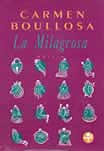
From the publisher:
Murder in Mexico City. A body clutching a bundle of papers and a tape recording. Murder foul, murder intriguing, murder… political?
A woman who can make your dreams come true. A miracle-worker who has the power, by allowing the wishes of other people to enter into her dreams, to answer their prayers. To make the sick well, the old young, the ugly beautiful, the miserable happy.
So they hope.
But what does she do when a ruthless and ambitious man petitions her to help him in his quest for power? When corpse after corpse is discovered and they all seem to have some connection?…
Carmen Boullosa is a name to conjure with. Her vibrant new novel is one to enjoy. In the Miracle Worker we meet for the first time one of the most impressive talents in contemporaty Mexican letters and a thoroughly bewitching writer.
Jonathan Cape edition, London, 1994
Editions:
La milagrosa, Ediciones ERA, México, 1994.
Die Wundertäterin, Suhrkamp Verlag, Frankfurt, 1996.
Die Schone Slaapster, Arena, Verlag, Amsterdam, 1996.
La milagrosa, trad. Pino Cacucci, Giangicomo Feltrinelli Editori, 2001.
Reviews:
Ricardo Pohlenz:
La trayectoria literaria de Carmen Boullosa está marcada por la especulación formal, por un replanteamiento constante de los recursos y de sus alcances, en los que aprehende, primero la anécdota, y luego la trama que la reviste: de la imagen, como consecución lógica, deviene la historia. Lo que es, al mismo tiempo, una apuesta en antecedentes y una meditación del punto originario; una operación de deslinde desde el acto de narrar y de su cuestionamiento intrínseco, como amalgama que propone un juego alternativo a las posibilidades de solución (eso, claro, de haberla).
El semanario del Novedades, 1994.
Jörg Drews:
There is a particular way of presenting Latin American themes in literature which has developed over the years in which, rethorically, is both extremely clever and pleasantly slick. This even includes authors such as García Márquez and Vargas Llosa whose great success has not been for no reason. In presenting what she thinks about Mexico, Carmen Boullosa has developed a narrative strategy which is merciless in its severity and excludes every kind of easily consumable rhetoric. Her language is wiry, direct, absolute. She assumes that her readers are able for a story that cannot simply be savoured in slumps. The texture of this book is as springly as that of a hard rubber ball, and when it hits, it hurts. Unlike the miracle worker, this book is not guilty of the major crime of making the course of life pleasant.
Süddeutsche Zeitung, 1996.
Kay Pritchett:
The work of Carmen Boullosa, the Mexican novelist, playwright and poet, has been called complex and fantastical. Both adjetives apply to La Milagrosa, which presents itself as a detective story but then reveals profound symbolic reference to matters of Mexican identity. …
Many will enjoy Boullosa´s most recent novel. More thoughtful readers will find the correspondences between its characters and Mexican realities -or unrealities- alluring. Readers seeking simple diversion will be entertained by its intrigue, for essentially it is a kind of whodunit, related not by a detective but by an unnamed character who finds La Milagrosa diary, her lover´s tapes, and some other document in the clenched fists of an unidentified male corpse. Untypical of its genre, however, Boullosa´s novel clarifies neither who did it nor exactly what was done. Readers will enjoy coming up with their own answers.
World Literature Today, Autumn, 1994.
